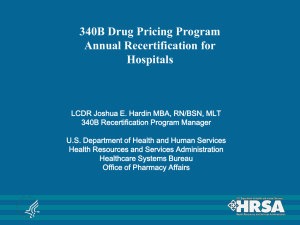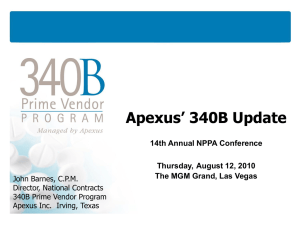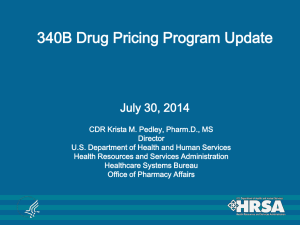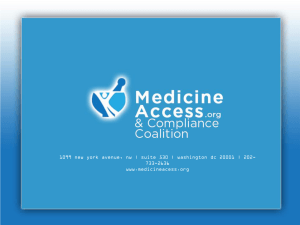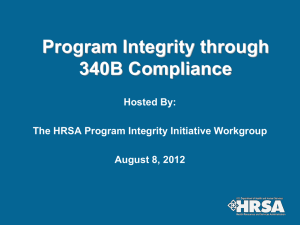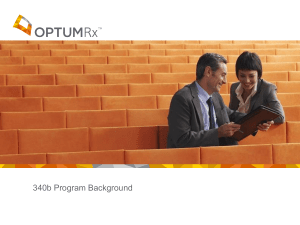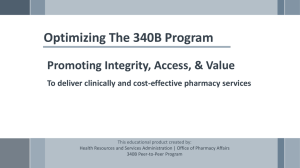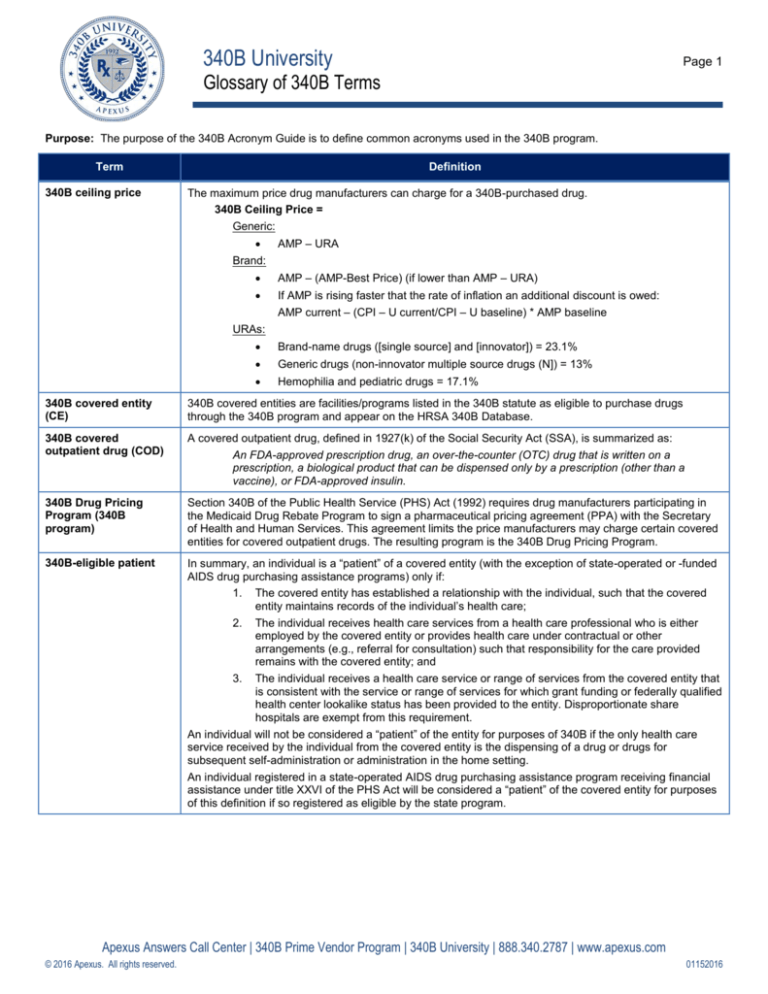
340B University
Page 1
Glossary of 340B Terms
Purpose: The purpose of the 340B Acronym Guide is to define common acronyms used in the 340B program.
Term
340B ceiling price
Definition
The maximum price drug manufacturers can charge for a 340B-purchased drug.
340B Ceiling Price =
Generic:
Brand:
AMP – URA
AMP – (AMP-Best Price) (if lower than AMP – URA)
If AMP is rising faster that the rate of inflation an additional discount is owed:
AMP current – (CPI – U current/CPI – U baseline) * AMP baseline
URAs:
Brand-name drugs ([single source] and [innovator]) = 23.1%
Generic drugs (non-innovator multiple source drugs (N]) = 13%
Hemophilia and pediatric drugs = 17.1%
340B covered entity
(CE)
340B covered entities are facilities/programs listed in the 340B statute as eligible to purchase drugs
through the 340B program and appear on the HRSA 340B Database.
340B covered
outpatient drug (COD)
A covered outpatient drug, defined in 1927(k) of the Social Security Act (SSA), is summarized as:
An FDA-approved prescription drug, an over-the-counter (OTC) drug that is written on a
prescription, a biological product that can be dispensed only by a prescription (other than a
vaccine), or FDA-approved insulin.
340B Drug Pricing
Program (340B
program)
Section 340B of the Public Health Service (PHS) Act (1992) requires drug manufacturers participating in
the Medicaid Drug Rebate Program to sign a pharmaceutical pricing agreement (PPA) with the Secretary
of Health and Human Services. This agreement limits the price manufacturers may charge certain covered
entities for covered outpatient drugs. The resulting program is the 340B Drug Pricing Program.
340B-eligible patient
In summary, an individual is a “patient” of a covered entity (with the exception of state-operated or -funded
AIDS drug purchasing assistance programs) only if:
1. The covered entity has established a relationship with the individual, such that the covered
entity maintains records of the individual’s health care;
2. The individual receives health care services from a health care professional who is either
employed by the covered entity or provides health care under contractual or other
arrangements (e.g., referral for consultation) such that responsibility for the care provided
remains with the covered entity; and
3. The individual receives a health care service or range of services from the covered entity that
is consistent with the service or range of services for which grant funding or federally qualified
health center lookalike status has been provided to the entity. Disproportionate share
hospitals are exempt from this requirement.
An individual will not be considered a “patient” of the entity for purposes of 340B if the only health care
service received by the individual from the covered entity is the dispensing of a drug or drugs for
subsequent self-administration or administration in the home setting.
An individual registered in a state-operated AIDS drug purchasing assistance program receiving financial
assistance under title XXVI of the PHS Act will be considered a “patient” of the covered entity for purposes
of this definition if so registered as eligible by the state program.
Apexus Answers Call Center | 340B Prime Vendor Program | 340B University | 888.340.2787 | www.apexus.com
© 2016 Apexus. All rights reserved.
01152016
340B University
Page 2
Glossary of 340B Terms
Term
Definition
340B ID
A unique identification number provided by HRSA to identify a 340B-eligible entity on the 340B Database.
This 340B ID is used to purchase 340B drugs.
340B Orphan Drug List
(published by HRSA)
HRSA’s list of orphan drug designations used by 340B stakeholders to ensure compliance with the Orphan
Drug Exclusion. The list is updated quarterly and is based on the list of orphan drug designations provided
by the U.S. FDA, Office of Orphan Products Development. Covered entities may need to conduct
additional analyses of the drugs provided on HRSA’s list to determine the appropriate drugs to exclude for
340B Program purposes. The list is posted at
http://www.hrsa.gov/opa/programrequirements/orphandrugexclusion/index.html.
340B Prime Vendor
Program (PVP)
HRSA is required by the 340B statute to establish a prime vendor program. This PVP is responsible for
securing sub-ceiling discounts on outpatient drugs and discounts on other pharmacy-related products and
services for participating 340B entities. The current 340B Prime Vendor Program (PVP) is managed by
Apexus, through a contract awarded by HRSA. Apexus serves participants in three primary roles:
1.
Negotiates sub-ceiling 340B pricing on branded and generic pharmaceuticals
2.
Establishes distribution solutions and networks that improve access to affordable medications
3.
Provides other value-added pharmacy-related products and services to its participants
5i drugs
5i drugs are drugs that are inhaled, infused, instilled, implanted, or injectable. This definition is pending a
proposed CMS rule, and there may be an alternate AMP calculation for these drugs.
Accountable care
organizations (ACOs)
Groups of doctors, hospitals, and other health care providers that come together voluntarily to give
coordinated high-quality care to their Medicare patients. The goal of coordinated care is to ensure that
patients, especially the chronically ill, get the right care at the right time while avoiding unnecessary
duplication of services and preventing medical errors. When an ACO succeeds in both delivering highquality care and spending health care dollars more wisely, it will share in the savings it achieves for the
Medicare program. HRSA has issued a policy release regarding 340B and ACOs.
Actual acquisition cost
(AAC)
The net cost of a drug paid by a pharmacy. AAC may vary by container size and whether or not the drug
was purchased from a manufacturer or wholesaler. AAC typically includes discounts, rebates,
chargebacks, and other price adjustments, but excludes dispensing fees. States may define AAC
differently for purposes of Medicaid reimbursement, and some states ask entities to determine or
reimburse using an “estimated acquisition cost.”
AMP true-up
An AMP true-up occurs when manufacturers restate their reported AMP for a specific time period and then
refund any difference to 340B participating entities that had made purchases at the incorrect price.
Apexus
A for-profit entity that is currently contracted as HRSA’s 340B Prime Vendor. Apexus has its own board of
directors, including covered entity organizations and industry experts. The organization is self-funded
through nominal administration fees from its contracted suppliers and is responsible for meeting the
contractual requirements of the 340B Prime Vendor agreement. The current agreement expires in 2019.
Apexus Generics
Portfolio (AGP)
The Apexus Generics Portfolio offers discounts on noncontract items for which entities currently pay
wholesaler acquisition cost (WAC) pricing. Apexus provides the AGP for outpatient covered and
noncovered drugs; this portfolio provides discounted contract pricing, which has no reference to the 340B
ceiling pricing, although it can be lower than 340B. The APG is subcontracted to wholesalers and extended
to Apexus participants.
Apexus PVP sub-340B
Apexus PVP sub-340B pricing reflects pricing that is negotiated by Apexus with branded and/or generic
manufacturers offering sub-340B pricing.
Apexus PVP sub-WAC
Apexus PVP sub-WAC contracted pricing allows entities subject to the GPO Prohibition to order covered
outpatient drugs in situations that would otherwise require the entity to purchase at WAC pricing. This
pricing is negotiated without regard to 340B pricing and use of this pricing is GPO Prohibition compliant.
Pricing is negotiated for outpatient covered drugs at sub-WAC or GPO-similar prices.
Apexus Answers Call Center | 340B Prime Vendor Program | 340B University | 888.340.2787 | www.apexus.com
© 2016 Apexus. All rights reserved.
01152016
340B University
Page 3
Glossary of 340B Terms
Term
Definition
Apexus value-added
As HRSA’s 340B Prime Vendor, Apexus is authorized to contract for other products and services required
by the outpatient pharmacy environment. Other value-added contracts are for noncovered drugs such as
vaccines, blood glucose monitoring supplies, prescription vials and labels, and discounts on service
contracts such as pharmacy automation hardware and software.
Average manufacturer
price (AMP)
AMP is the average unit price paid in the United States to the manufacturer by wholesalers for drugs
distributed to the retail pharmacy class of trade, after deducting customary prompt-pay discounts
(excluding direct sales to hospitals and health maintenance organizations, and to wholesalers where the
drug is re-labeled under the distributor’s National Drug Code [NDC] number). Originally created as a
benchmark by Congress to aid in calculating Medicaid rebates, several legislative changes have recently
affected the definition of AMP. A CMS proposed rule is pending that addresses the AMP definition.
Because 340B is calculated based on AMP, changes in this proposed rule will result in changes to the
340B program.
The base AMP is the calculated AMP for the first full quarter after the market date of the drug.
Average sales price
(ASP)
Originally created during drug pricing litigation to ensure accurate price reporting, ASP is the weighted
average of all non-federal sales to wholesalers. ASP is net of chargebacks, discounts, rebates, and other
benefits tied to the purchase of the drug product, regardless of whether it is paid to the wholesaler or the
retailer. Excluded from ASP are sales that are excluded from the best price calculation. ASP is used as a
basis of reimbursement for some Medicare Part B covered drugs and biologicals administered in hospital
outpatient departments.
Average wholesale
price (AWP)
AWP is a publicly available, national average of list prices charged by wholesalers to pharmacies. AWP is
not defined in legislation, and does not account for discounts. It is sometimes referred to as a “sticker
price,” as it is not an actual price paid by most purchasers. AWP was once used as a primary basis of
pharmacy reimbursement, but there is a trend moving away from this practice.
Banking
Banking occurs when an entity was initially registered in the HRSA 340B Database as participating, but for
a period of time did not place 340B purchases. At some point later in time, the entity places large 340B
replenishment orders based on 340B “banked” orders that theoretically could have been placed previously,
but were not.
HRSA has not authorized the use of a credit/rebill, banking, or similar process to re-characterize previous
transactions. Covered entities participating in the 340B program are responsible for requesting 340B
pricing at the time of the original purchase. If a covered entity wishes to reclassify a previous purchase as
340B, the entity should first notify manufacturers and ensure that all processes are fully transparent, with a
clear audit trail that reflects the actual timing and facts underlying a transaction. The covered entity retains
responsibility for ensuring full compliance and integrity of its use of the 340B program.
Best price (BP)
See Medicaid best price.
“Big 4”
The federal government’s four largest purchasers of pharmaceuticals: Department of Veterans Affairs (VA),
Department of Defense (DoD), Public Health Service (PHS), and Coast Guard.
Billing address
The HRSA 340B Database uses the “billing address” field to denote the address verified as belonging to
the covered entity. A billing address is not required to be a physical address; it can be a P.O. box or other
mailing address.
Bundled sales
An arrangement, regardless of physical packaging, under which the rebate, discount, or other price
concession is conditioned on the purchase of the same drug, drugs of different types (that is, at the ninedigit NDC level), or another product or some other performance requirement. Example of such
performance requirements include the achievement of market share, inclusion or tier placement on a
formulary, or the resulting discounts or other price concessions being greater than those that would have
been available had the bundled drugs been purchased separately or outside the bundled arrangement.
Apexus Answers Call Center | 340B Prime Vendor Program | 340B University | 888.340.2787 | www.apexus.com
© 2016 Apexus. All rights reserved.
01152016
340B University
Page 4
Glossary of 340B Terms
Term
Definition
Carve-out/carve-in
See Medicaid carve-out/Medicaid carve-in.
Centers for Medicare
and Medicaid Services
(CMS)
The federal agency charged with implementing and overseeing the Medicare and Medicaid programs.
Chargeback
A chargeback is the method wholesalers use to request reimbursement from manufacturers for 340B
discounts provided to entities for 340B covered outpatient drugs. Wholesalers purchase drugs from the
manufacturer at wholesale acquisition cost (WAC), but sell to 340B entities at the contracted 340B price,
which is much less. The wholesaler submits a chargeback request to the manufacturer to account for the
difference.
Children’s hospital
(PED)
These nonprofit hospitals serve individuals under 19 years old and have a CMS-issued 3300 Series
Medicare Provider Number to designate them as Medicare certified children’s hospitals. Children’s
hospitals must meet certain requirements, including a DSH adjustment percentage >11.75% and
compliance with the GPO Prohibition, to be eligible to participate in the 340B program.
Consumer Price IndexUrban (CPI-U)
The Consumer Price Index-Urban (CPI-U) is a measure of the average change over time in the prices paid
by urban consumers for a market basket of consumer goods and services. CPI-U is used in determining
whether or not to apply a penalty to the manufacturer for the 340B ceiling price for single-source and
innovator multiple-source drugs.
Contract pharmacy
340B covered entities may contract with a pharmacy or pharmacies to provide services to the covered
entity’s patients, including the service of dispensing the entity-owned 340B drugs. To engage in a contract
pharmacy arrangement, the entity and pharmacy (or pharmacies) must have a written contract that aligns
with the compliance elements listed in guidance, and must list the contract pharmacy on the HRSA 340B
Database during a quarterly registration period. Typically, a bill-to (entity)/ship-to (pharmacy) arrangement
is used.
Corporate integrity
agreement (CIA)
OIG negotiates CIAs with health care providers and other entities as part of the settlement of federal health
care program investigations arising under a variety of civil false claims statutes. Drug manufacturers
sometimes enter into CIAs as a result of pricing calculation settlements.
Critical access hospital
(CAH)
A critical access hospital is a hospital certified to receive cost-based reimbursement from Medicare. This
reimbursement is intended to improve the hospital’s financial performance, thereby reducing hospital
closures. CAHs are certified under different, more flexible Medicare conditions of participation (CoP) than
that of acute care hospitals, and must meet certain criteria to be designated as CAHs. For the purposes of
340B, CAHs must meet specific 340B eligibility criteria, including abiding by the orphan drug prohibition.
CAHs are not subject to the 340B program’s GPO Prohibition.
Deficit Reduction Act,
2005 (DRA)
This federal legislation permitted manufacturers to include certain sales to 340B entities as nominal prices,
and initially conferred 340B eligibility for children’s hospitals.
Dispensing fee
A dispensing fee is the charge for the professional services provided in association with prescription
dispensing. Most prescription payers reimburse on the basis of a benchmark of the drug cost (e.g., ASP,
AMP, AWP, WAC, AAC) plus a dispensing fee.
Disproportionate share
adjustment (DSH rate)
See Medicare DSH adjustment percentage.
Disproportionate share
hospital (DSH)
Disproportionate share hospitals serve a significantly disproportionate number of low-income patients; as
such, they receive adjustment payments to provide additional help. The primary method of qualification is
based on the sum of the percentage of Medicare inpatient days and the percentage of total patient days
attributable to patients eligible for Medicaid but not eligible for Medicare Part A. Among other requirements,
DSHs must have a DSH adjustment percent >11.75% to be 340B eligible.
Apexus Answers Call Center | 340B Prime Vendor Program | 340B University | 888.340.2787 | www.apexus.com
© 2016 Apexus. All rights reserved.
01152016
340B University
Page 5
Glossary of 340B Terms
Term
Definition
Disproportionate share
hospital (DSH) inpatient
pricing
The voluntary DSH inpatient contracts most GPOs offer their membership; the discount is usually ~2–3%.
GPOs offer manufacturers this opportunity to put products on the DSH inpatient portfolio at a lower amount
than what the manufacturer has given the GPO (i.e., in the GPO acute care file/and/or for products that the
manufacturer chooses not to contract under the GPO acute care file).
Duplicate discount
A duplicate discount, prohibited by 340B statute, occurs when manufacturers provide both a 340B discount
on a drug AND pay a Medicaid rebate to the State on the same drug. A duplicate discount would occur if
an up-front 340B discount is given and the state submits the same claim for a back-end Medicaid rebate.
340B covered entities are prohibited from causing a duplicate discount to occur.
Edit date
The HRSA 340B Database uses the term “edit date” to denote the date that a 340B entity’s information
was edited. Edits to the HRSA 340B Database can occur at any time.
Estimated acquisition
cost (EAC)
The estimation of the price typically paid by entities for a particular manufacturer’s drug, using the most
commonly purchased package size. Some Medicaid agencies are using EAC (plus a dispensing fee) as a
basis for establishing reimbursement, especially for 340B entities. The exact method of calculating or
projecting EAC may vary in different states.
Federal ceiling price
(FCP)
The maximum price that a manufacturer may charge for a covered drug sold to the “big 4” federal entities
engaged in providing health care services—Veterans Affairs, Department of Defense, Public Health
Service (including Indian Health Service), and the Coast Guard . The federal ceiling price is effective for a
calendar year, or the portion of a calendar year in which the covered drug is marketed.
Federal supply
schedule (FSS)
The federal supply schedule involves large contracts through which federal customers can acquire more
than 4 million products and services directly from more than 8,000 commercial suppliers. Products include
pharmaceuticals and medical equipment and supplies. These contracts are available for use by all
government agencies, including, but not limited to, VA medical centers, Department of Defense, Bureau of
Prisons, Indian Health Service, Public Health Service, and some state veterans’ homes.
Free-standing cancer
hospital (CAN)
A free-standing cancer hospital (CAN) is a nonprofit entity that is financially and administratively
independent (not a part of a larger institution). CAN hospitals are exempt from Medicare’s prospective
payment system. For 340B purposes, a CAN hospital must meet specific eligibility requirements, including
a DSH adjustment percentage >11.75%, and compliance with the GPO Prohibition and Orphan Drug
Prohibition.
Government
Accountability Office
(GAO)
The U.S. Government Accountability Office (GAO) is an independent nonpartisan agency that works for
Congress. Often called the “congressional watchdog,” GAO investigates how the federal government
spends taxpayer dollars.
GPO Prohibition
The GPO Prohibition, per 340B statute, prohibits 340B participating disproportionate share hospitals
(DSH), children’s hospitals (PED), and free-standing cancer hospitals (CAN) from obtaining covered
outpatient drugs through group purchasing organizations. Upon enrollment, an entity official signs a form
attesting that the hospital will comply with the GPO Prohibition. This applies to the hospital as of the date of
listing on the HRSA 340B Database. Upon recertification of information on the HRSA 340B Database, the
hospital official attests to compliance with the GPO Prohibition. A Policy Release about GPO was posted
by HRSA in February 2013.
Group purchasing
organization (GPO)
A group purchasing organization is an organization created to leverage the purchasing power of entities to
obtain discounts from vendors based on the collective buying power of the GPO members. GPOs are
common in the drug industry; the GPO may set mandatory purchasing participation levels from its
members or be completely voluntary. Certain 340B participating hospitals (disproportionate share hospitals
[DSH], children’s hospitals [PED], and free-standing cancer hospitals [CAN]) are prohibited from
purchasing covered outpatient drugs from a GPO. The PVP portfolio is not considered a GPO.
Health Industry Number
(HIN)
A unique, universal identification number to be used by all trading partners when they communicate with
one another via computer. HINs are randomly assigned, nine-character, alpha-numeric identifiers that are
issued by the Health Industry Business Communications Council (HIBCC). Drug wholesalers and
manufacturers typically use HINs to identify entities.
Apexus Answers Call Center | 340B Prime Vendor Program | 340B University | 888.340.2787 | www.apexus.com
© 2016 Apexus. All rights reserved.
01152016
340B University
Page 6
Glossary of 340B Terms
Term
Definition
Health Insurance
Portability and
Accountability Act
(HIPAA)
The Health Insurance Portability and Accountability Act, is a US law designed to provide privacy standards
to protect patients' medical records and other health information provided to health plans, doctors,
hospitals and other health care providers.
Health Resources and
Services
Administration (HRSA)
An agency of the U.S. Department of Health and Human Services, HRSA is the primary federal agency for
improving access to health care services for people who are uninsured, isolated, or medically vulnerable.
Comprising five bureaus and ten offices, HRSA provides leadership and financial support to health care
providers in every state and U.S. territory. The Office of Pharmacy Affairs (OPA), the office responsible for
administering the 340B program, falls under the Healthcare Systems Bureau within HRSA.
HRSA 340B Database
The HRSA 340B Database is located here: http://opanet.hrsa.gov/opa/default.aspx. Entities, contract
pharmacies and manufacturers submit information to HRSA’s OPA to include in the database. HRSA
verifies this information and incorporates it into the database as appropriate.
In-house pharmacy
A pharmacy that is owned by, and a legal part of, the 340B entity. Typically, in-house pharmacies are listed
as shipping addresses of the entity and the entity owns the pharmacy license.
Innovator multiple
source drug
All covered outpatient drugs approved under a new drug application (NDA), product license approval
(PLA), establishment license approval (ELA), or antibiotic drug approval (ADA). A covered outpatient drug
marketed by a cross-licensed producer or distributor under the approved NDA shall be included as an
innovator multiple source drug when the drug product meets this definition.
Manufacturer
A manufacturer (for 340B purposes) includes all entities engaged in:
1.
The production, preparation, propagation, compounding, conversion, or processing of prescription
drug products, either directly or indirectly by extraction from substances of natural origin, or
independently by means of chemical synthesis, or by a combination of extraction and chemical
synthesis; or
2.
The packaging, repackaging, labeling, relabeling, or distribution of prescription drug products. A
manufacturer must hold legal title to or possession of the NDC number for the covered outpatient
drug. Such term does not include a wholesale distributor of drugs or a retail pharmacy licensed
under state law.
“Manufacturer” also includes an entity, described in (1) or (2) above, that sells outpatient drugs to covered
entities, whether or not the manufacturer participates in the Medicaid rebate program. For more
information, visit ftp://ftp.hrsa.gov/bphc/pdf/opa/pricingagreement.pdf
Medicaid best price
(BP)
Regarding the Medicaid Rebate Program, Medicaid best price is the lowest manufacturer price paid for a
prescription drug, regardless of package size, by any purchaser. BP is reported to CMS and states, but
otherwise is confidential. Included in BP are cash discounts, free goods that are contingent upon purchase,
volume discounts, and rebates. Excluded from BP are prices paid by the federal government (e.g., prices
to the “big 4”, 340B covered entities, federal supply schedule, state pharmaceutical assistance programs,
depot prices, and nominal pricing to covered entities).
Medicaid carve-in
340B entities may elect to use drugs purchased at 340B prices to bill for Medicaid patients. This activity is
termed a “Medicaid carve-in.” If an entity chooses to use 340B drugs to bill Medicaid it must indicate this on
the Medicaid Exclusion File and list the appropriate Medicaid provider numbers or NPIs. Entities must
inform HRSA whether they are carving in or out.
Medicaid carve-out
340B entities may elect to use non-340B drugs to bill for Medicaid patients. This activity is termed a
“Medicaid carve-out.” Entities may choose to do this so they can receive fair Medicaid reimbursement
(many states reimburse entities that use 340B for Medicaid patients on a cost + dispensing fee basis, as
the dispensing fee is often not high enough to cover costs). Entities must inform HRSA whether they are
carving in or out through the Medicaid Exclusion File.
Apexus Answers Call Center | 340B Prime Vendor Program | 340B University | 888.340.2787 | www.apexus.com
© 2016 Apexus. All rights reserved.
01152016
340B University
Page 7
Glossary of 340B Terms
Term
Definition
Medicaid Exclusion File
HRSA established the Medicaid Exclusion File to help support program integrity regarding the statutory
prohibition of duplicate discounts. The Medicaid Exclusion File is maintained on the HRSA 340B website
and contains the National Provider Identification (NPI) number or Medicaid Provider Number of entities that
use 340B discounted drugs to bill Medicaid for their patients.
Entities are expected to provide updated information to HRSA for incorporation into the Medicaid Exclusion
File. The covered entity should be billing according to their designation on the Exclusion File. The covered
entity should immediately inform HRSA of any changes. The Medicaid Exclusion File is used as follows:
All entities must inform HRSA whether they will use 340B drugs to bill for Medicaid patients.
Entities using 340B purchased drugs for Medicaid patients must inform HRSA of their
NPI/Medicaid Provider Number(s).
Medicaid Agencies use the Medicaid Exclusion File to identify the NPI or Medicaid Provider
Number of the entities purchasing at 340B prices.
The state Medicaid agency excludes from its rebate requests to manufacturers all claims
associated with entities whose NPIs/Medicaid Provider Numbers are listed in the Medicaid
Exclusion File.
Manufacturers use the Medicaid Exclusion File to verify denial of rebate payment on claims
associated with entities purchasing at 340B prices.
Medicaid rebate net
price
The price for covered outpatient drugs paid by state Medicaid programs, including the manufacturer
rebates received by the states.
Medicare and Medicaid
Extenders Act, 2010
This federal legislation clarified that children’s hospitals should continue to receive 340B prices on orphan
drugs.
Medicare DSH
adjustment percentage
An adjustment applied to hospitals that treat a high percentage of low-income patients. This adjustment
results in an additional payment to these hospitals. Factors included in this adjustment are the sum of the
ratios of Medicare Part A Supplemental Security Income (SSI) patient days to total Medicare patient days
and Medicaid patient days to total patient days in the hospital. 340B covered entity hospitals must meet a
certain threshold for disproportionate share adjustment percentage: >11.75% for DSH, PED, and CAN, and
≥8% for RRC and SCH.
Medicare Modernization
Act, 2003 (MMA)
This federal legislation made it easier for rural hospitals to meet one requirement for 340B eligibility
(reaching the 11.75% DSH adjustment threshold).
Mixed-use setting
A hospital area that serves a mixed patient type of both inpatients and outpatients. Often these are facilities
such as surgery centers, cardiac catheter labs, infusion centers, and emergency departments.
National Drug Code
(NDC)
Drug products are identified and reported using a unique, three-segment number, called the National Drug
Code (NDC), which serves as a universal product identifier for human drugs. FDA publishes the listed NDC
numbers and the information submitted as part of the listing information in the NDC Directory, which is
currently updated semimonthly. It is an 11-digit number; the first segment (5 digits) of the NDC indicates
the manufacturer, the second segment (4 digits) indicates the drug product, and the third segment (2 digits)
indicates the package size.
National Provider
Identifier (NPI)
The National Provider Identifier (NPI) is a unique identification number for covered health care providers.
Covered health care providers and all health plans and health care clearinghouses must use the NPIs in
the administrative and financial transactions adopted under HIPAA. The NPI is a 10-position, intelligencefree numeric identifier (10-digit number).
Apexus Answers Call Center | 340B Prime Vendor Program | 340B University | 888.340.2787 | www.apexus.com
© 2016 Apexus. All rights reserved.
01152016
340B University
Page 8
Glossary of 340B Terms
Term
Nominal price
Definition
A nominal price is any price less than 10% of the AMP in the same quarter for which the AMP is calculated.
Only nominal price sales to 340B entities and other safety net providers, as specified by CMS, are
excluded from the calculation of:
Average sales price (ASP)
Best price (BP)
Average manufacturer price (AMP)
Non-federal average
manufacturer price
(non-FAMP)
Non-federal average manufacturer price is the average price paid to a manufacturer by wholesalers for
drugs distributed to non-federal purchasers. Non-FAMP is not publicly available. 340B and Prime Vendor
sub-ceiling prices are excluded from a manufacturer’s non-FAMP calculations.
Non-innovator multiple
source drug
A non-innovator multiple source drug is a drug that is not originally marketed under an original new drug
application, and whose therapeutic equivalent is available from multiple sources
Office of Pharmacy
Affairs (OPA)
The Office of Pharmacy Affairs (OPA) is the HRSA office responsible for administering the 340B program.
Office of Inspector
General (OIG),
Department of Health
and Human Services
The Office of Inspector General is an independent and objective oversight unit of the Department of Health
and Human Services (HHS) to carry out the mission of promoting economy, efficiency, and effectiveness
through the elimination of waste, abuse, and fraud.
The OIG:
Conducts and supervises audits, investigations, and inspections.
Identifies systemic weaknesses giving rise to opportunities for fraud and abuse in HHS programs
and operations and makes recommendations to prevent their recurrence.
Leads and coordinates activities to prevent and detect fraud and abuse in HHS programs and
operations.
Detects wrongdoers and abusers of HHS programs and beneficiaries so appropriate remedies
may be brought to bear.
Keeps the HHS Secretary and Congress fully and currently informed about problems and
deficiencies in the administration of HHS programs.
The OIG has issued several reports relating to 340B.
Office of Regional
Operations (ORO),
Health Resources and
Services
Administration
The Office of Regional Operations (ORO) works through HRSA’s 10 regional offices to improve health care
systems and America’s health care safety net, increase access to quality care, reduce disparities, and
advance public health. The ORO conducts 340B audits, with oversight by HRSA.
Orphan Drug Act (ODA)
The Orphan Drug Act (ODA) provides for granting special status to a product to treat a rare disease or
condition upon request of a sponsor. The combination of the rare disease or condition and the product to
treat it must meet certain criteria. This status is referred to as orphan designation. Orphan designation
qualifies the sponsor of the product for the tax credit and marketing incentives of the ODA.
The Affordable Care Act restricted newly eligible 340B entities (critical access hospitals [CAH], rural
referral centers [RRC], sole community hospitals [SCH], and free-standing cancer hospitals [CAN]) from
purchasing orphan designated drugs at 340B prices. In July 2014, HRSA issued an interpretive rule,
pertaining to the statutory requirement for inclusion of drugs with orphan drug designations in the 340B
drug pricing program.
Orphan drug
“approved”
An orphan-designated product is considered “approved” by the U.S. Food and Drug Administration (FDA)
Office of Orphan Products Development (OOPD) if it has received marketing approval for an indication that
falls within the designated disease or condition.
Apexus Answers Call Center | 340B Prime Vendor Program | 340B University | 888.340.2787 | www.apexus.com
© 2016 Apexus. All rights reserved.
01152016
340B University
Page 9
Glossary of 340B Terms
Term
Definition
Orphan drug
“designation”
The Orphan Drug Act (ODA) provides for granting special status to a drug or biological product (“drug”) to
treat a rare disease or condition upon request of a sponsor. This status is referred to as orphan designation
(or sometimes “orphan status”). For a drug to qualify for orphan designation, both the drug and the disease
or condition must meet certain criteria specified in the ODA and FDA’s implementing regulations at 21 CFR
Part 316.
Orphan drug exclusion
As part of the Affordable Care Act, designated orphan drugs were excluded from the definition of covered
outpatient drug for Critical Access Hospitals (CAH), Rural Referral Centers (RRC), Sole Community
Hospitals (SCH) and Free Standing Cancer Hospitals (CAN); these entities can’t purchase designated
orphan drugs at 340B prices. An Interpretive Rule issued in July 2014, clarifies how this section (340Be)
will be implemented in these entity types only.
Orphan drug “opt in”
340B hospitals subject to the Orphan Drug Exclusion may choose to purchase orphan drugs used for a
non-orphan indication under the 340B program, or “opt in.” If they make this choice, they are required to
maintain audible records to demonstrate compliance with the Orphan Drug Exclusion.
Orphan drug “opt out”
340B hospitals subject to the Orphan Drug Exclusion that cannot or do not wish to maintain auditable
records regarding compliance with the Orphan Drug Exclusion may “opt out.” If they make this choice, they
will purchase all orphan drugs outside of the 340B program, regardless of the indication for which the drug
is used.
Orphan drug “sponsor”
The party that owns or has assigned rights to an orphan drug designation granted by the FDA. Sponsors
listed on the FDA orphan drug list may not be the current manufacturer for an orphan drug if ownership or
rights have been subsequently transferred.
Orphan drug
“withdrawn”
An orphan-designated drug with marketing approval may have its marketing approval withdrawn for the
designated use.
Outpatient clinic
To purchase/use 340B drugs, a hospital outpatient clinic must:
Be an integral part of a 340B eligible hospital.
Appear as a reimbursable clinic above line 96 on Worksheet A of the hospital’s most recently
filed Medicare cost report.*
Have patients that meet the criteria in the 340B patient definition guideline.
Submit to HRSA the most recently filed cost report to verify clinic eligibility.
Be listed on the HRSA 340B Database as eligible to participate.
*Special requirements may apply to certain children’s hospitals (PED).
Patient assistance
programs (PAPs)
Programs whereby drug manufacturers provide free or greatly subsidized medications to patients in need
of assistance.
Patient Protection and
Affordable Care Act
(PPACA), 2010
Federal legislation that affected the 340B program in the following ways:
Expanded eligibility to include certain critical access hospitals (CAH), sole community
hospitals (SCH), rural referral centers (RRC), and free-standing cancer centers (CAN).
Required HRSA to publish ceiling pricing and actual pricing data submitted by drug
manufacturers.
Increased the Medicaid rebate percentage (from 15.1% to 23.1% for brand-name drugs; to
17.1% for clotting factors and pediatric drugs; and from 11% to 13% for generics).
Created integrity provisions for manufacturers, including the ability to impose fines on
manufacturers for violations of 340B, increased price transparency, and new processes for
dispute resolution and recovery of overcharges.
Created integrity provisions for entities, including civil penalties for providers knowingly
violating the prohibition against diversion of 340B drugs.
Directed the Government Accountability Office (GAO) to prepare a 340B-related report to
Congress.
Apexus Answers Call Center | 340B Prime Vendor Program | 340B University | 888.340.2787 | www.apexus.com
© 2016 Apexus. All rights reserved.
01152016
340B University
Page 10
Glossary of 340B Terms
Term
Definition
Penny price
A term used to describe the price that results when the calculation for a 340B price yields zero. The
manufacturers have been instructed to charge a “penny” for the smallest unit of measure of the product
(often per tablet or per package). HRSA has published a policy release clarifying its penny pricing policy.
Pharmaceutical pricing
agreement (PPA)
This agreement is required for manufacturers who have executed a Medicaid rebate agreement with CMS
and voluntary for those who do not have a current Medicaid rebate agreement. The pharmaceutical pricing
agreement must be signed by a corporate officer of the company (e.g., president, chief executive officer, or
general counsel; signatures by vice presidents or directors of sales or marketing will not be accepted). A
PPA remains in effect until terminated by either the manufacturer or the Secretary of HHS. It is not
automatically terminated if a manufacturer terminates its Medicaid rebate agreement.
Pharmacy benefit
manager (PBM)
An administrator of prescription drug programs. PBMs are responsible for processing and paying
prescription drug claims, and often for developing and maintaining a formulary of drugs. PBMs also may
contract with pharmacies and negotiate discounts and rebates with drug manufacturers. 340B entities often
use a PBM in multiple contract pharmacies, but the use of a PBM is not required.
Physician-administered
drugs
Drugs administered directly by a physician or a physician designee to a patient. This may occur in 340B
entities such as federal qualified health centers (FQHCs), or it may occur in an outpatient clinic setting of a
hospital.
Private label product
Private label products are typically those manufactured or provided by one company for offer to
customers/members under another company’s (GPO) brand. These products are typically the same
(chemically) as the manufacturer’s labeled product, but just labeled under the offered company’s own
branding.
Provider-based
regulations or status
Medicare sets standards that “provider-based” departments or clinics must meet to enable the entity to bill
Medicare a facility fee under the outpatient prospective payment system. Hospitals seek provider-based
status for financial reasons.
Recertification
HRSA is required by statute to conduct annual recertification of participating 340B covered entities’
information listed in the HRSA 340B Database. As part of this process, an authorizing official from each
340B entity certifies basic information about the entity and its 340B compliance. Covered entities with
inaccurate information in the HRSA 340B Database run a high risk of being removed from the program.
Reclassification
Reclassification (sometimes also called recharacterization) occurs when a credit–rebill process is used to
reclassify information about a transaction after it initially occurred. Examples of reclassified information
might include the purchasing contract used or the time of dispensing.
HRSA has not authorized the use of a credit–rebill, banking, or similar process to recharacterize previous
transactions. Covered entities participating in the 340B program are responsible for requesting 340B
pricing at the time of the original purchase. If a covered entity wishes to reclassify a previous purchase as
340B, covered entities should first notify manufacturers and ensure that all processes are fully transparent,
with a clear audit trail that reflects the actual timing and facts underlying a transaction. The covered entity
retains responsibility for ensuring full compliance and integrity of its use of the 340B program.
Replenishment (340B
outpatient drug)
340B outpatient drug replenishment occurs when a non-340B drug is initially dispensed to a 340B eligible
patient, and an entity later replaces the non-340B dispensed drug with 340B purchased inventory. The
replaced inventory, although it was purchased at 340B prices, is no longer considered 340B inventory, as
the title passes to the pharmacy after purchase.
Rural referral center
(RRC)
A Medicare participating acute care hospital is classified as an RRC if it is located in a rural area and it
meets specific criteria.
Shipping address
The HRSA 340B Database uses the “shipping address” field to denote a location that may have 340B
drugs shipped to it. This address must be a physical address (no P.O. boxes). A shipping address may
include in-house pharmacies, entity-owned warehouses, central fill facilities, repackagers, and the like.
Apexus Answers Call Center | 340B Prime Vendor Program | 340B University | 888.340.2787 | www.apexus.com
© 2016 Apexus. All rights reserved.
01152016
340B University
Page 11
Glossary of 340B Terms
Term
Definition
Single source drug
A covered outpatient drug that is produced or distributed under an original new drug application approved
by the Food and Drug Administration, including a drug product marketed by any cross-licensed producers
or distributors operating under the new drug application (NDA). It also includes a covered outpatient drug
approved under a product license approval (PLA), establishment license approval (ELA), or antibiotic drug
approval (ADA).
Social Security Act,
1935 (SSA)
This federal legislation defines many key terms that apply to the 340B program, including covered
outpatient drug and covered entity types (e.g., FQHC and different hospitals such as DSH, CAH, SCH)
Sole community
hospital (SCH)
A hospital paid under the Medicare Acute Care Hospital Inpatient Prospective Payment System (IPPS) is
eligible to be classified as an SCH if it meets specific criteria determined by CMS. Typically, these hospitals
furnish short-term, acute care; are paid under the Medicare Acute Care Hospital IPPS; are not critical
access hospitals (CAH); and are not paid under any other Medicare prospective payment system.
Split-billing software
Split-billing software is used in settings where a 340B entity uses multiple wholesaler contracts for drug
purchasing. This software helps the entity track and separate (“split”) the 340B-eligible dispensations from
the non-340B dispensations, and ultimately builds purchase orders based on varied information.
Start date
The HRSA 340B Database uses the term “start date” to denote an entity’s start date in the 340B program.
Entity start dates are updated quarterly.
Telepharmacy
Telepharmacy involves the use of electronic information and communication technology to provide and
support the delivery of pharmacy services (including drug product and professional pharmacist services) to
locations that are remote from a physical pharmacy.
Termination date
The HRSA 340B Database uses the term “termination date” to denote the date that the 340B entity is
terminated from the 340B program. As of this date, the entity may no longer purchase 340B or use drugs.
Termination dates are updated on a quarterly basis.
Unit rebate amount
(URA)
CMS computes this amount and state Medicaid programs apply utilization information to it in order to
invoice drug manufacturers for rebates.
Vendor
340B entities may elect to purchase services, designed to simplify or optimize 340B participation, from a
variety of organizations collectively called 340B vendors.
Wholesale acquisition
cost (WAC)
The price paid by a wholesaler (or direct purchaser) in the United States for drugs purchased from the
drug’s manufacturer or supplier. Publicly available WAC lists do not represent actual transaction prices and
do not include prompt pay or other discounts, rebates, or reductions in price.
Wholesaler
A drug wholesaler is an organization that provides drugs to entities, serving as the distributor between the
drug manufacturer and the entity. Typically, states define the term “wholesaler,” so exact definitions may
vary from state to state.
This tool is written to align with Health Resources and Services Administration (HRSA) policy, and is provided only as an example for the purpose of encouraging 340B Program integrity. This information has not
been endorsed by HRSA and is not dispositive in determining compliance with or participatory status in the 340B Drug Pricing Program. 340B stakeholders are ultimately responsible for 340B program compliance
and compliance with all other applicable laws and regulations. Apexus encourages each stakeholder to include legal counsel as part of their program integrity efforts.
© 2015 Apexus. Permission is granted to use, copy and distribute this work solely for 340B covered entities and Medicaid Agencies.
Apexus Answers Call Center | 340B Prime Vendor Program | 340B University | 888.340.2787 | www.apexus.com
© 2016 Apexus. All rights reserved.
01152016

